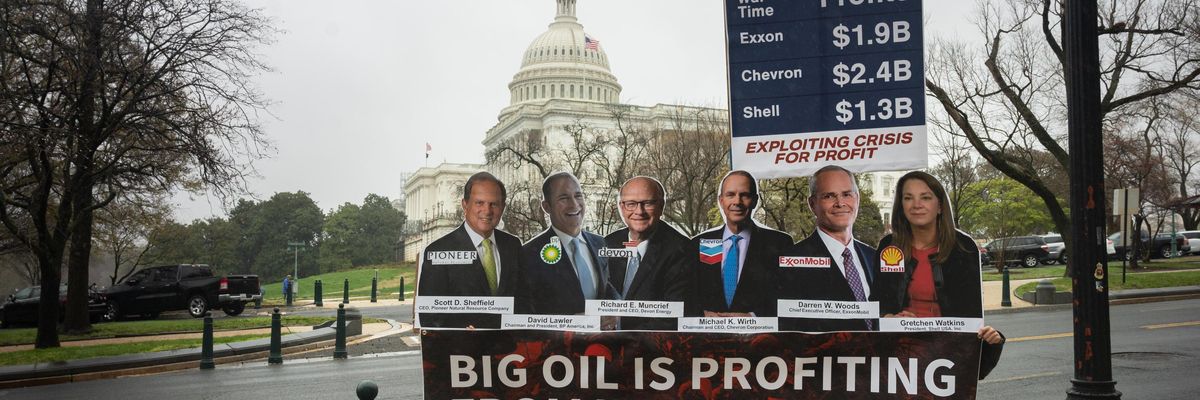
Activists demonstrate outside of the U.S. Congress in Washington, D.C. prior to an April 6, 2022 House Energy and Commerce Committee hearing on Big Oil profiteering. (Photo: Kevin Wolf/AP Images)
To donate by check, phone, or other method, see our More Ways to Give page.

Activists demonstrate outside of the U.S. Congress in Washington, D.C. prior to an April 6, 2022 House Energy and Commerce Committee hearing on Big Oil profiteering. (Photo: Kevin Wolf/AP Images)
Amid record gas prices and fossil fuel industry profits, Big Oil is "trying to squeeze even more cash out of American consumers," according to a report published Wednesday by the watchdog group Accountable.US.
"Unfortunately for consumers, good news for Big Oil's bottom line never seems to be good news for them."
The report--entitled High Prices Make Big Oil Profits Soar--details how "in the first three months of the year, 21 oil and gas companies made over $41 billion in profits, more than doubling profits from just a year ago. This is, on average, $1.2 billion more per company than the same time last year thanks to--as the companies themselves say--high oil prices and the crisis in Ukraine."
Accountable.US energy and environment director Jordan Schreiber said in a statement that "this year is shaping up to be even better than the last for the oil and gas industry. Unfortunately for consumers, good news for Big Oil's bottom line never seems to be good news for them."
"Make no mistake," she added, "these oil and gas companies would rather take their billions in profits and pass them on to wealthy industry executives than do anything to stabilize gas prices for consumers."
\u201cBig Oil is continuing to report record high profits in 2022.\n\nYou are continuing to pay over $4 a gallon at the pump, rather than companies using their profits to provide consumers a break while filling their gas tanks. https://t.co/g3XlOYhIPy\u201d— Accountable.US (@Accountable.US) 1651936149
According to Accountable.US, Shell led all fossil fuel companies with more than $7.1 billion in first quarter profits, followed by Chevron with $6.3 billion, and ConocoPhillips and ExxonMobil, which each earned over $5.7 billion.
The report notes that Jeff Miller, CEO of the oil services giant Halliburton--which is responsible for most of the world's fracking operations--boasted during a quarterly earnings call that a "perpetual threat of undersupply that is supportive to commodity prices" is "great" for business.
Another CEO, Hess Corporation's John Hess, said the company is "positioned to fully benefit" from a "significant increase in volatility and liquidity risk in the oil markets following Russia's invasion of Ukraine."
Related Content

The report also details how, despite "raking in sky-high profits," fossil fuel corporations are "giving all their 'excess' cash to investors with plans to give even more as the year goes on."
"Big Oil is using its windfall profits from high prices to shower $11.8 billion in dividends and $14 billion in stock buybacks onto shareholders," it states, noting that ExxonMobil raised its share buyback program by $20 billion to $30 billion through 2023, and Chevron repurchased a record $10 billion in stock in one quarter.
"And who benefits from massive shareholder payouts? Wealthy oil and gas CEOs," the report continues. "Stocks heavily pad the paychecks of top oil and gas CEOs with the heads of companies like Exxon and Chevron receiving more than 50% of their over-$22 million compensations from stock."
A separate Accountable.US analysis published last month revealed that CEOs from 28 leading fossil fuel companies enjoyed a combined $394 million in total compensation in 2021.
\u201cWe pay high gas prices at the pump, but who profits? Big Oil. \n\n@ExxonMobil profits are at their highest levels in nearly a decade, but they're not using their profits to lower prices - instead, they're repurchasing stock to reward its billionaire shareholders.\u201d— Sunrise Movement \ud83c\udf05 (@Sunrise Movement \ud83c\udf05) 1651866242
Even with such record-breaking profits, shareholder rewards, and executive pay and bonuses, oil and gas companies including Chevron still attempted to exploit the war in Ukraine to secure long-term commitments from the Biden administration to support the domestic fossil fuel industry.
According to a 2021 analysis by the Washington, D.C.-based Environmental and Energy Study Institute, "U.S. direct subsidies to the fossil fuel industry are estimated at roughly $20.5 billion per year, including $14.7 billion from federal subsidies and $5.8 billion from state subsidies."
Amid soaring corporate profits and growing societal inequality, progressive advocates have been increasingly calling for a corporate windfall tax.
Related Content

In March, Sen. Bernie Sanders (I-Vt.) introduced the Ending Corporate Greed Act, which aims to end corporate price gouging by imposing up to a 95% windfall tax, a temporary emergency measure that proponents say could raise an estimated $400 billion in one year from 30 of the largest corporations alone.
Trump and Musk are on an unconstitutional rampage, aiming for virtually every corner of the federal government. These two right-wing billionaires are targeting nurses, scientists, teachers, daycare providers, judges, veterans, air traffic controllers, and nuclear safety inspectors. No one is safe. The food stamps program, Social Security, Medicare, and Medicaid are next. It’s an unprecedented disaster and a five-alarm fire, but there will be a reckoning. The people did not vote for this. The American people do not want this dystopian hellscape that hides behind claims of “efficiency.” Still, in reality, it is all a giveaway to corporate interests and the libertarian dreams of far-right oligarchs like Musk. Common Dreams is playing a vital role by reporting day and night on this orgy of corruption and greed, as well as what everyday people can do to organize and fight back. As a people-powered nonprofit news outlet, we cover issues the corporate media never will, but we can only continue with our readers’ support. |
Amid record gas prices and fossil fuel industry profits, Big Oil is "trying to squeeze even more cash out of American consumers," according to a report published Wednesday by the watchdog group Accountable.US.
"Unfortunately for consumers, good news for Big Oil's bottom line never seems to be good news for them."
The report--entitled High Prices Make Big Oil Profits Soar--details how "in the first three months of the year, 21 oil and gas companies made over $41 billion in profits, more than doubling profits from just a year ago. This is, on average, $1.2 billion more per company than the same time last year thanks to--as the companies themselves say--high oil prices and the crisis in Ukraine."
Accountable.US energy and environment director Jordan Schreiber said in a statement that "this year is shaping up to be even better than the last for the oil and gas industry. Unfortunately for consumers, good news for Big Oil's bottom line never seems to be good news for them."
"Make no mistake," she added, "these oil and gas companies would rather take their billions in profits and pass them on to wealthy industry executives than do anything to stabilize gas prices for consumers."
\u201cBig Oil is continuing to report record high profits in 2022.\n\nYou are continuing to pay over $4 a gallon at the pump, rather than companies using their profits to provide consumers a break while filling their gas tanks. https://t.co/g3XlOYhIPy\u201d— Accountable.US (@Accountable.US) 1651936149
According to Accountable.US, Shell led all fossil fuel companies with more than $7.1 billion in first quarter profits, followed by Chevron with $6.3 billion, and ConocoPhillips and ExxonMobil, which each earned over $5.7 billion.
The report notes that Jeff Miller, CEO of the oil services giant Halliburton--which is responsible for most of the world's fracking operations--boasted during a quarterly earnings call that a "perpetual threat of undersupply that is supportive to commodity prices" is "great" for business.
Another CEO, Hess Corporation's John Hess, said the company is "positioned to fully benefit" from a "significant increase in volatility and liquidity risk in the oil markets following Russia's invasion of Ukraine."
Related Content

The report also details how, despite "raking in sky-high profits," fossil fuel corporations are "giving all their 'excess' cash to investors with plans to give even more as the year goes on."
"Big Oil is using its windfall profits from high prices to shower $11.8 billion in dividends and $14 billion in stock buybacks onto shareholders," it states, noting that ExxonMobil raised its share buyback program by $20 billion to $30 billion through 2023, and Chevron repurchased a record $10 billion in stock in one quarter.
"And who benefits from massive shareholder payouts? Wealthy oil and gas CEOs," the report continues. "Stocks heavily pad the paychecks of top oil and gas CEOs with the heads of companies like Exxon and Chevron receiving more than 50% of their over-$22 million compensations from stock."
A separate Accountable.US analysis published last month revealed that CEOs from 28 leading fossil fuel companies enjoyed a combined $394 million in total compensation in 2021.
\u201cWe pay high gas prices at the pump, but who profits? Big Oil. \n\n@ExxonMobil profits are at their highest levels in nearly a decade, but they're not using their profits to lower prices - instead, they're repurchasing stock to reward its billionaire shareholders.\u201d— Sunrise Movement \ud83c\udf05 (@Sunrise Movement \ud83c\udf05) 1651866242
Even with such record-breaking profits, shareholder rewards, and executive pay and bonuses, oil and gas companies including Chevron still attempted to exploit the war in Ukraine to secure long-term commitments from the Biden administration to support the domestic fossil fuel industry.
According to a 2021 analysis by the Washington, D.C.-based Environmental and Energy Study Institute, "U.S. direct subsidies to the fossil fuel industry are estimated at roughly $20.5 billion per year, including $14.7 billion from federal subsidies and $5.8 billion from state subsidies."
Amid soaring corporate profits and growing societal inequality, progressive advocates have been increasingly calling for a corporate windfall tax.
Related Content

In March, Sen. Bernie Sanders (I-Vt.) introduced the Ending Corporate Greed Act, which aims to end corporate price gouging by imposing up to a 95% windfall tax, a temporary emergency measure that proponents say could raise an estimated $400 billion in one year from 30 of the largest corporations alone.
Amid record gas prices and fossil fuel industry profits, Big Oil is "trying to squeeze even more cash out of American consumers," according to a report published Wednesday by the watchdog group Accountable.US.
"Unfortunately for consumers, good news for Big Oil's bottom line never seems to be good news for them."
The report--entitled High Prices Make Big Oil Profits Soar--details how "in the first three months of the year, 21 oil and gas companies made over $41 billion in profits, more than doubling profits from just a year ago. This is, on average, $1.2 billion more per company than the same time last year thanks to--as the companies themselves say--high oil prices and the crisis in Ukraine."
Accountable.US energy and environment director Jordan Schreiber said in a statement that "this year is shaping up to be even better than the last for the oil and gas industry. Unfortunately for consumers, good news for Big Oil's bottom line never seems to be good news for them."
"Make no mistake," she added, "these oil and gas companies would rather take their billions in profits and pass them on to wealthy industry executives than do anything to stabilize gas prices for consumers."
\u201cBig Oil is continuing to report record high profits in 2022.\n\nYou are continuing to pay over $4 a gallon at the pump, rather than companies using their profits to provide consumers a break while filling their gas tanks. https://t.co/g3XlOYhIPy\u201d— Accountable.US (@Accountable.US) 1651936149
According to Accountable.US, Shell led all fossil fuel companies with more than $7.1 billion in first quarter profits, followed by Chevron with $6.3 billion, and ConocoPhillips and ExxonMobil, which each earned over $5.7 billion.
The report notes that Jeff Miller, CEO of the oil services giant Halliburton--which is responsible for most of the world's fracking operations--boasted during a quarterly earnings call that a "perpetual threat of undersupply that is supportive to commodity prices" is "great" for business.
Another CEO, Hess Corporation's John Hess, said the company is "positioned to fully benefit" from a "significant increase in volatility and liquidity risk in the oil markets following Russia's invasion of Ukraine."
Related Content

The report also details how, despite "raking in sky-high profits," fossil fuel corporations are "giving all their 'excess' cash to investors with plans to give even more as the year goes on."
"Big Oil is using its windfall profits from high prices to shower $11.8 billion in dividends and $14 billion in stock buybacks onto shareholders," it states, noting that ExxonMobil raised its share buyback program by $20 billion to $30 billion through 2023, and Chevron repurchased a record $10 billion in stock in one quarter.
"And who benefits from massive shareholder payouts? Wealthy oil and gas CEOs," the report continues. "Stocks heavily pad the paychecks of top oil and gas CEOs with the heads of companies like Exxon and Chevron receiving more than 50% of their over-$22 million compensations from stock."
A separate Accountable.US analysis published last month revealed that CEOs from 28 leading fossil fuel companies enjoyed a combined $394 million in total compensation in 2021.
\u201cWe pay high gas prices at the pump, but who profits? Big Oil. \n\n@ExxonMobil profits are at their highest levels in nearly a decade, but they're not using their profits to lower prices - instead, they're repurchasing stock to reward its billionaire shareholders.\u201d— Sunrise Movement \ud83c\udf05 (@Sunrise Movement \ud83c\udf05) 1651866242
Even with such record-breaking profits, shareholder rewards, and executive pay and bonuses, oil and gas companies including Chevron still attempted to exploit the war in Ukraine to secure long-term commitments from the Biden administration to support the domestic fossil fuel industry.
According to a 2021 analysis by the Washington, D.C.-based Environmental and Energy Study Institute, "U.S. direct subsidies to the fossil fuel industry are estimated at roughly $20.5 billion per year, including $14.7 billion from federal subsidies and $5.8 billion from state subsidies."
Amid soaring corporate profits and growing societal inequality, progressive advocates have been increasingly calling for a corporate windfall tax.
Related Content

In March, Sen. Bernie Sanders (I-Vt.) introduced the Ending Corporate Greed Act, which aims to end corporate price gouging by imposing up to a 95% windfall tax, a temporary emergency measure that proponents say could raise an estimated $400 billion in one year from 30 of the largest corporations alone.